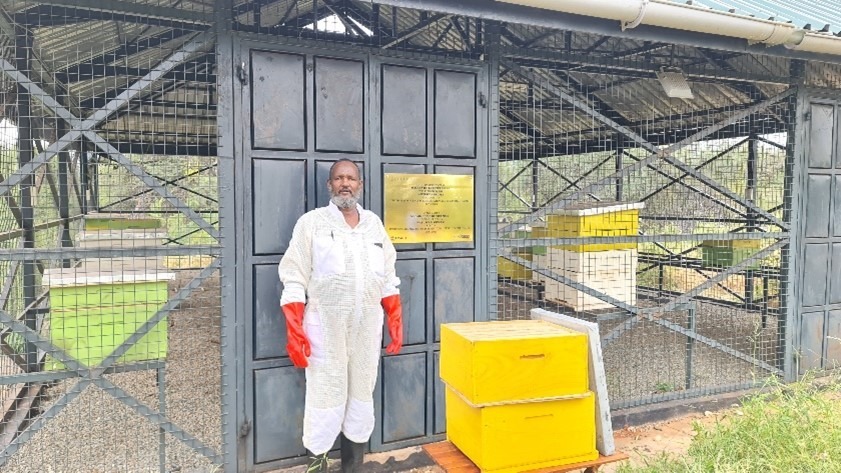
Like many people in Wajir County, Ahmed Hussein made a living as a crop farmer and livestock producer. But with every season, the harsh weather conditions reduced the productivity of his crops and livestock. Each month he brought home approximately $330; not enough to cover the basic needs of his household of seven adults and 14 children. Without extra income, he was unable to cover the cost of food, education fees, and health care.
Ahmed has lived in Bute town in Wajir County all his life. The county is located in northeastern Kenya and is made up of arid and semi-arid lands, prone to seasonal flooding and swamps. 85 percent of the population in Wajir County are livestock keepers and nomadic pastoralism defines the lifestyle for many families. Even with 97 acres of land, Ahmed’s large number of livestock overgrazed on the pasture reducing livestock productivity. The solution for him was to pivot to another industry – beekeeping. In 2016, he kicked off his business with 16 beehives even though many people saw beekeeping as a business opportunity for the destitute in the community.
In 2020, the Feed the Future Kenya Livestock Market Systems Activity (LMS) circulated an advertisement in Bute town offering to support businesses through grants. Ahmed applied for a grant and after a feasibility assessment, LMS granted Ahmed $68,000 to modernize his apiary and build a larger storage facility. The grant balance helped him acquire 118 beehives, a honey extractor, and a honey presser. He also acquired two honey sieving tanks, five pairs of bee suits, five pairs of gumboots, a bee brush, a hive tool, and a smoker.
With expanded production capacity, Ahmed now makes an average profit of $780 each harvesting season. He uses his income for family meals and education fees. Ahmed also created jobs for three youth members from his community and started training other honey producers in Wajir North on beekeeping, apiary setting, colony division, and harvesting. To date, he has trained 134 people in beekeeping who have gone on to improve their businesses. He now plans to build a modern training center for beekeepers.
“Beekeeping has given me financial freedom and enabled me to be productive in my retirement years. I can now provide for my family’s needs comfortably. This would not have been possible were it not for the bees.”
-Ahmed hussein
The Feed the Future Livestock Market System Activity aims to build the resilience of communities to shocks and stressors while strengthening the potential of pastoralists, community groups, cooperatives, and entrepreneurs, enabling households to generate more income within the sector and diversify their incomes.
Learn more about the Feed the Future Kenya Livestock Market Systems Activity.








